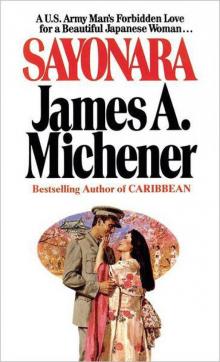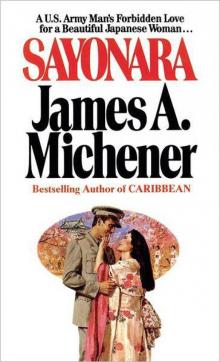- Home
- James A. Michener
The World Is My Home: A Memoir Page 8
The World Is My Home: A Memoir Read online
Page 8
Kimbrell confused me, because my only knowledge of quasi-diplomats had come from the movies, where they all looked like Lewis Stone with chiseled features, neat white hair and aloof manners. Kimbrell, by contrast, was a slob. He was in his fifties, overweight, with an undistinguished round face that always looked as if it needed a shave, and a fringe of unkempt white hair. He had a bit of a stoop, a round belly and a habit of wearing bedroom slippers during the daytime, even when conducting business in his office.
He was assisted in his labors by a secretary, a local young woman, and therein lay the beginning of his troubles, for in choosing his secretary he had passed over several older women who handled English well and one who had actually served as secretary to one of his predecessors. Instead he picked one of the all-time beauties of Polynesia, and if I use this description with obvious enthusiasm I do it also with strict adherence to the truth, for Reri, her professional name, had been the glowing star of Robert Flaherty’s 1931 motion picture classic, Tabu, and had also acted in the Laughton-Gable 1935 blockbuster, Mutiny on the Bounty. During a publicity tour of France she was reputed to have been the constant companion of Maurice Chevalier and the toast of the boulevards because of her joyous, uninhibited behavior. In 1944, when I knew her, she had put on a little weight, was somewhat younger than I and possessed one of the most radiant faces I had ever seen. She was a glorious woman, Anna Chevalier in real life, member of the immense Chevalier family with seven or eight young girls almost as pretty as she, and a major feature of island life. Tahiti was proud of Reri.
We liked each other from the start, but I knew she was spoken for by at least two strong-minded men and maybe more, and she suspected that I might be in Tahiti to check on her rather unconventional behavior. I let her know in one unspoken way or another that she had nothing to fear from me, and she let me know that I was more than welcome to make my headquarters in one of the big houses her family occupied: ‘You’ll hardly be noticed,’ she said, and that turned out to be true, for when I was given a bunk in the big wooden house I was one of fifteen or sixteen and no one noticed my comings and goings.
Because some of the things I have to report concerning Tahiti in those days may seem unusual or even outrageous, I had better relate two incidents that established the pattern for me. Once while I was hanging out in Quinn’s Bar listening to Eddie Lund pound out his rhythms, the gang received a cable from a London free-lance writer informing us that he would be arriving in Tahiti shortly on an exciting assignment and he required a young woman who could drive a Renault, swim under water and develop Kodak film. We spent several days endeavoring to find a young woman who had the rather specific qualifications and who would also be his attractive hostess. For a time it looked as if we were going to fail, because the requirement for the ability to develop film eliminated several otherwise eligible beauties.
Filling the request became a challenge, as if failing to do so would somehow be a blot not only on Tahiti but also on the Quinn’s Bar gang. However, some ingenious fellow concluded that he could teach the most likely of the applicants to handle the Kodak, so when the young man arrived from London all was in readiness. He was met at the airport by a fine-looking young woman driving a Renault and fully prepared to help him on his article on reef life in Polynesia with some excellent underwater color photographs. After doing the article he stayed on for some months, for as he told us: ‘It would be crazy to go back to London in February.’ Later I saw that the beautiful girl who had done much of the underwater work for him was driving a rather smart Renault, which he had left behind in appreciation for her services.
More to the point, I think, was the incident that occurred during my first trip when a ne’er-do-well from Austria, a fascinating chap, arrived with the announcement that he was a baron. Now, we all knew he wasn’t a baron, couldn’t possibly be, and had probably left Vienna just ahead of the sheriff, but as someone at Quinn’s pointed out: ‘We’ve never had a baron in Papeete and it would be rather nice.’ So he was accepted on his own terms, and when I saw him years later I discovered that he had made himself into a baron, and he was a lot more convincing in his role than some true barons I had known in Austria.
In Tahiti one could be whatever one desired to be, and several times I saw someone who had been a man the day before suddenly appear as a woman, with the implied announcement that henceforth that was his gender, and she was accepted as such without further comment.
With that sort of attitude the people of Papeete were not especially concerned when mystery-man Robert Kimbrell fell in love with his secretary, Reri (there was some question among the gang at Quinn’s as to whether Reri knew how to type; giving her the benefit of the doubt, we said ‘Maybe’). Our real discussion centered on the fact that Reri was also being avidly courted by a stranger whom none of us could properly place. Lieutenant Commander Paul McClintock was obviously an American naval officer, and he appeared to be on temporary duty from our naval headquarters in Honolulu. We took an instant dislike to each other, for I spotted him as a pompous snob, an Annapolis man, no doubt, and he dismissed me as a mere lieutenant scarcely worthy of his attention. I had to admit, however, that he was taller, trimmer, better-looking, more military in appearance and more secretive in whatever he was doing than I was. At one point I began to wonder if he had been sent down to check on me.
What really sickened me was that McClintock was behaving like such an ass, bringing scorn on the rest of us in uniform. He was in love with Reri, whom he had seen in Tabu when it came to Amherst when he was a junior there, and he was now overcome by the wonder of his romantic situation: being on one of the most famous islands in the South Seas and being the swain of a Polynesian movie celebrity. Of course, I felt pretty much the same, but I was not making a fool of myself about it.
So here was this tropical quadrangle: the radiant Polynesian movie star is loved by the moonstruck U.S. Navy lieutenant commander, who does not know that she is sleeping with the older diplomat, all of whom are being watched with envy by a somewhat junior officer on Halsey’s staff. I envied Reri the exciting life she had known in Paris; I envied Ratchett Kimbrell the fact that he had Reri as his love and I did not; and I envied McClintock for his handsome bearing, his important assignment in Honolulu and his willingness to pay open court to a beautiful woman. I would not admit to myself that in this affair I was a sorry mess, but in fact I was not far from it.
I took evil delight in watching from my own safe hiding places Lieutenant Commander McClintock come marching home at eleven each evening with Reri on his arm, he having treated her to the best dinner available in Papeete with a helping of French champagne, and now bidding her a chaste good night as if he were an actor in a scene from Dumas or Victor Hugo: kissing her hand, looking at her longingly and then marching off, his heart on fire. It was too much.
In the meantime Ratchett Kimbrell would have been waiting among some flowering bushes across from the hotel where McClintock had been led to believe Reri was staying, and when the consul was satisfied that the lovesick officer was safely gone, out he came in his bedroom slippers, shuffled across the open area, took the waiting Reri by the arm and led her off to bed in the consulate.
My problem with Ratchett and Reri had nothing to do with who was sleeping with whom or that an important naval officer was being made to look ridiculous; it involved something more serious. Ratchett, fed up with the dull routine of his duties in Tahiti, had turned over his top-secret code books to Reri. She kept them in the unlocked drawer of her desk and not only found pleasure in unraveling the messages that came to the office but also invited any girlfriends who happened to be dropping by to experience the fun of deciphering top-secret material. This had been going on for some time before I reached Papeete and the facts in the cables were widely known, not because Reri had talked but because some of her friends had circulated stories of what had come in via code.
I found it impossible to believe that either Washington or Allied headquarters in Noumea (in
New Caledonia) knew anything specific about the code books, because if they did they surely would have taken steps to halt the practice. Their information dealt only with Ratchett’s failure to certify ships properly and the general carelessness of his operation; there was probably also something about allowing native women to have the run of his offices, but I supposed that this had happened at other posts without disrupting things.
I did not know what to do about the code books, for I was obviously not the ‘senior United States officer present,’ a phrase that carried considerable weight in the military; Lieutenant Commander McClintock outranked me by a considerable margin, and it was quite possible that he too was in Tahiti to look into the Kimbrell business. At any rate I decided to leave the matter to others for the time being; my assignment had been merely to find out what was happening.
In the meantime, through the good offices of Lew Hirshorn, I was meeting an exciting array of Tahitian residents. There were English remittance men living well on allowances that would have been niggardly had their recipients fled to southern France, sons of important American industrial families who had gone native and Europeans of all sorts. But the man I had been most eager to meet was not in Tahiti during the war. On later trips I would get to know James Norman Hall, famous co-author of the Bounty trilogy, and his delightful English-Polynesian wife, Lala Winchester, daughter of an English sea captain and a Tahitian princess. They were a grand couple, he stately and reserved, she a bubbling fount of funny stories and outrageous rumors about the ridiculous behavior of island couples.
Hall was famous for his novels and the superb movies that had been made from them. Most strangers who made a pilgrimage from their cruise ships to see him praised Mutiny on the Bounty, but I had been especially taken by both the book and the movie of Hurricane, and he was amused to find that I could recall one admirable scene after another of that grand picture: ‘I liked Bounty of course. Everyone did. But I must say I preferred Hurricane because it dealt with island life, island characters and settings.’ He made no comment, but when I began to show that I could recall most of the scenes in the picture, he became interested.
‘Why did it strike you so favorably?’ he asked, and I said: ‘From that opening scene when the island doctor played by Thomas Mitchell stands at the railing of his ship and speaks mournfully of the lost island of Manakoora to the final scene, when Raymond Massey, looking through his telescope, sees clearly that the escaping criminal, Jon Hall, and his wife, Dorothy Lamour, are in the canoe, but tells his wife, Mary Astor: “You’re right.… It’s only a floating log,” it was all so Tahiti, so right.’
‘You really studied the picture, didn’t you?’
‘I memorized it—saw it twice in the States—and then we had it at our base at Espiritu Santo.’
Of course, everyone who visited Tahiti heard the rumor that Hall’s collaborator, Charles Nordhoff, had supplied the poetic passages in their books and had created the characters, while Hall merely worked out the plot devices and the long narrative portions, but having met Hall and seen the poetry in his eyes when I mentioned specific scenes, I gave no credence to that rumor. I did ask him how the partners had decided whose name should come first, and he gave an instructive answer: ‘It’s always effective to end a sentence or anything else with a short, crisp word. Hall and Nordhoff doesn’t sound half as effective.’
I never met Nordoff and am not sure he was living in Tahiti during my various trips, and, except for that terse comment about name order, I never heard Hall speak about him; I judged that he was fed up with visitors who wanted to discuss aspects of their collaboration, one of the most famous in history.
But to get back to my wartime stay in Tahiti: I was sorry to have missed Hall for a specific reason. I had been told he was a friend of Robert Dean Frisbie, the writer, and I regretted not learning what Hall might know about him. But Lew Hirshorn was able to fill that gap: ‘Everyone in Tahiti knows the Frisbie story. Young American of great promise, came out here penniless and went native. Could write like an angel, even Hall says that: “Great talent. Knows far more about the islands than I ever will, but self-destructive. Doomed.” The Americans in Tahiti often discuss what we can do to help Frisbie. He has four or five children, you know, and even though we feel sorry for the way he has to live, we do admire him for refusing to abandon the kids. Where he goes, they go. But he’s a cantankerous son-of-a-bitch. Won’t let you help him, so we’ve pretty much written him off.’
‘His wife?’
‘Dead.’
‘If I am able to help him, then what?’
‘He’ll go on dragging his kids from one lonely atoll to another, pitiful case. Hall told me once: “Because I’ve found a steady life I’ve known the paradise that the South Pacific can be. Frisbie knows the hell.” ’
‘What’s he doing on Pukapuka?’
‘Dying.’
I had never met Frisbie, but I had read one of his books that had been recommended to me by an Australian who had given it the same high praise as Hall. It was a lovely, relaxed account of life in the area I was coming to know so well, and it was obvious to me, having once been a book editor, that if Frisbie got hold of himself he could write a fine novel about the kind of adventures he’d had. To learn that he was dying was a shock.
But I would wait till I reached Pukapuka to grapple with that sad problem. Now I was immersed in the Ratchett Kimbrell matter and the more I saw of Ratchett, this relaxed Pickwick of a man, the more I liked him, for he was a person of wit but no guile. If he allowed Reri to handle his secret code books it was because he felt that she would gain pleasure from an exercise that bored him, and if he was willing to allow Lieutenant Commander McClintock to woo Reri during the early hours of the evening it was probably because it gave her a feeling of the old days in Paris to have such a young and gallant admirer. And, of course, Ratchett knew that when the young man had gone back to his hotel afire with the dreams of the South Pacific, Reri would be coming home with him. Me? I was now enraptured with one of Reri’s younger sisters or cousins, but I was as forlorn as McClintock because she was in love with someone else.
Still, I was enjoying myself in Papeete, for in the early part of the evening we all went to the movie house, which was a lively scene with young people all over the place and a level of noisy involvement that I had not seen elsewhere. The island had only one film, a colossal disaster called South of Pago Pago.
Victor McLaglen was the chief hero, Jon Hall of Hurricane the secondary hero, but we did not go to cheer them; we went to participate in one of the funniest scenes ever filmed. It hadn’t been meant to be funny when shot or when shown in a typical theater—in fact, it wasn’t even amusing in any normal situation—but in Papeete in that crowded theater it caused riots three nights a week.
The hilarity involved a local fellow, Bill Bambridge, who, after holding many jobs in Tahiti, wound up in Hollywood, where he was offered a series of minor roles, one of which was that of the native chieftain in South of Pago Pago. Bambridge was known in Tahiti to enjoy a beer now and then.
In his big scene, the one we waited for with mouths watering, Bambridge plays the part of an island chieftain striving to protect his people from the villains, who are endeavoring to neutralize him by getting him drunk. When the chief villain offers him a big glass of whiskey, he says in high moral dudgeon: ‘No! I never touch the stuff!’ whereupon the house went wild. I saw this movie four times, and at each screening the big self-denial scene got an increasingly rousing hand; the rest of the movie I have forgotten, but Bambridge’s big scene ranks in my memory with Clark Gable carrying Vivien Leigh up those stairs in Gone With the Wind.
Ratchett Kimbrell’s story came to an anticlimactic end, for when stars-in-his-eyes Lieutenant Commander McClintock was called back to Honolulu, he bade Reri a tearful farewell, kissed both her hands and was ferried to the airstrip at Bora Bora. Then, of course, Ratchett had Reri completely to himself. He eyed me suspiciously for a while as a possible rival i
n the McClintock vein, but my ambitions did not fly so high, and things were going along rather peacefully, with Reri and the other girls handling the secret dispatches and me sampling island life in the sprawling home of Reri’s family.
Then one day as I was lounging in Quinn’s, listening to Eddie Lund, two girls ran in from the American consulate with a message for me. It had arrived in code, of course, but they had decoded it and passed it around for others to see. It advised me that there had been trouble with the young Catholic priest in Fiji and that I should stop by the island on my way from Pukapuka.
The cable gave me much to think about, but the problems of the priest were not foremost. I wondered what might have happened if that cable had warned me about some possible misbehavior of the Vichy French supporters on the island, with the girls decoding it and passing it among their friends in the bars. The possible consequences were not pretty, so with my cable in my hand I went to confront Ratchett.

 Mexico
Mexico The World Is My Home: A Memoir
The World Is My Home: A Memoir Sayonara
Sayonara Chesapeake
Chesapeake The Novel
The Novel Rascals in Paradise
Rascals in Paradise Return to Paradise
Return to Paradise Presidential Lottery: The Reckless Gamble in Our Electoral System
Presidential Lottery: The Reckless Gamble in Our Electoral System The Source
The Source Poland
Poland Space
Space Caravans
Caravans Creatures of the Kingdom: Stories of Animals and Nature
Creatures of the Kingdom: Stories of Animals and Nature Iberia
Iberia Hawaii
Hawaii The Watermen: Selections From Chesapeake
The Watermen: Selections From Chesapeake Report of the County Chairman
Report of the County Chairman The Covenant
The Covenant The Bridges at Toko-ri
The Bridges at Toko-ri Matecumbe
Matecumbe Journey: A Novel
Journey: A Novel Centennial
Centennial Sports in America
Sports in America Texas
Texas Miracle in Seville
Miracle in Seville This Noble Land: My Vision for America
This Noble Land: My Vision for America Tales of the South Pacific
Tales of the South Pacific Bridges at Toko-Ri
Bridges at Toko-Ri Space: A Novel
Space: A Novel Presidential Lottery
Presidential Lottery Sayonara: A Novel
Sayonara: A Novel This Noble Land
This Noble Land The Covenant: A Novel
The Covenant: A Novel Miracle in Seville: A Novel
Miracle in Seville: A Novel The Bridge at Andau
The Bridge at Andau Source
Source The Source: A Novel
The Source: A Novel Journey
Journey Recessional: A Novel
Recessional: A Novel Legacy: A Novel
Legacy: A Novel The Bridges at Toko-Ri: A Novel
The Bridges at Toko-Ri: A Novel Poland: A Novel
Poland: A Novel